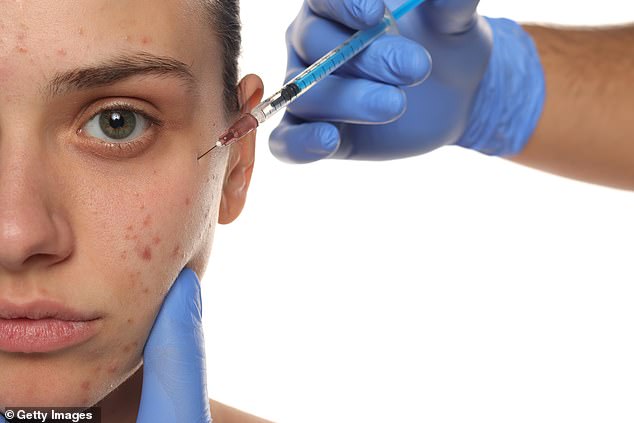Acne is the scourge of teenage life, with around only one in 20 people managing to get through adolescence without developing it to some degree, according to the NHS.
And while most grow out of it by their mid-20s (as the pubertal hormone surges that lead to oily skin and blocked pores start to settle down), at least 3 per cent are still affected by it well into their 30s and beyond.
Now there are high hopes that two new vaccines could not only banish hard-to-treat acne for good, but even stop spots developing in the first place.
Acne is caused when hair follicles become blocked by sebum, an oily substance released by glands near the surface of the skin to keep hair lubricated. Blockages occur when the glands produce too much sebum, which mixes with dead skin cells to form a plug – this then becomes contaminated by bacteria that live on the skin.
Treatments include antiseptic or antibiotic creams to reduce the number of offending bacteria on the skin, long-term antibiotics to kill the bugs, or powerful drugs such as isotretinoin (brand name Roaccutane), which shrinks the sebaceous glands and in turn reduces sebum production.
However, although very effective, there are downsides to using antibiotics long-term, and Roaccutane is linked with severe potential side-effects that include very dry skin, loss of libido, mood changes and, more rarely, suicidal thoughts.
The spots can also return when drug treatment is stopped.
The two vaccines currently in development could offer a safer and more permanent solution.

While most grow out of acne by their mid-20s, at least 3 per cent are still affected by it well into their 30s and beyond

Dr Justine Hextall, a consultant dermatologist, says it not clear how many specific acne-inducing bacteria the vaccines are able to target
One (being developed by French drug firm Sanofi) is made using technology similar to that used for Covid jabs, with fragments of genetic material called mRNA.
Instead of genetic material from the Covid virus, the acne jab uses genetic material that’s extracted from proteins found in Cutibacterium acnes, the family of bacteria that causes spots.
The idea is that once the immune system is exposed to these proteins via a vaccine, it produces antibodies to attack and destroy the excess bacteria in the skin. This then shrinks spots and leaves the skin clear.
These antibodies would then patrol the body for years afterwards to stop acne returning.
In animal tests, this vaccine was found to limit the growth of acne-inducing bacteria. Sanofi is now recruiting 400 people aged 18 to 45 with moderate to severe facial acne for a US trial, who will be given two jabs followed by a booster shot after one year.
A separate study for the same jab involving 200 people with mild acne is planned in Singapore. Results from both trials are expected in 2027.
Dr Justine Hextall, a consultant dermatologist at the private Tarrant Street Clinic in Arundel, said it’s not yet clear whether the Sanofi jab targets the specific type of C. acnes bacteria that cause spots, or all six types found on the skin. ‘This is important as some types of these bacteria are a crucial part of a microbiome [community of microbes] that keeps skin healthy and robust,’ she says.
Dr Anshoo Sahota, a consultant dermatologist at the private OneWelbeck clinic in London, noted that experience with mRNA-based Covid vaccines showed they start to wear off in as little as three months, ‘so these acne vaccinations may need to be regularly repeated’.
Meanwhile, a different vaccine is currently being developed that could potentially prevent skin outbreaks due to acne.
This second vaccine works by targeting an enzyme called hyaluronidase, which is secreted by the bacteria that cause acne. The enzyme helps spots form because it breaks down hyaluronic acid, a substance produced by the skin that stops it drying out.
Without hyaluronic acid, follicles can become inflamed, leading to blockages that allow the bacteria to thrive.
To make a vaccine, the enzyme is attached to what’s known as an adjuvant – a chemical that stimulates an immune response – and once injected, the immune system will release antibodies that attack hyaluronidase and stop this chain reaction.
A team of researchers at the University of California, San Diego, found that when they injected mice with the vaccine, it reduced the severity of acne by half compared to mice not given the jab, reported the journal Nature Communications in 2023.
Researchers now plan a trial to see if they can replicate these findings in humans. It’s likely to be at least five years before an anti-acne jab is available.
Professor Alison Layton, a consultant dermatologist at Harrogate and District NHS Foundation Trust and spokesperson for the British Association of Dermatologists, says: ‘These novel therapies are just entering into early-phase studies. But in future it’s possible that patients with a family history of acne might choose to have a preventative vaccine.’
She added it could also reduce the widespread use of long-term antibiotic therapy for acne, which could help to tackle the growing problem of antibiotic resistance, where overuse of the drugs leads to bacteria learning how to become immune to their effects.
But Dr Hextall adds that while ‘it might be viable in families with strong genetic links with acne, I’m not sure how many people will take up a vaccine for acne without any signs of the disease’.
